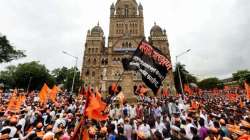'No valid ground to breach 50% ceiling': Supreme Court strikes down Maratha reservation in jobs, education
The Supreme Court on Wednesady struck down the Maratha reservation in government jobs and educational institutions.

Maratha Reservation Case: The Supreme Court on Wednesday set aside the Bombay High Court order and stuck down the reservation to Marathas in government jobs and admissions in Maharashtra. The verdict was pronounced by a five-judge constitution bench headed by Justice Ashok Bhushan.
The court held that there were no exceptional circumstances justifying the grant of reservation to Marathas in excess of 50% ceiling limit as a Socially and Economically Backward Class.
"Neither the Gaikwad Commission nor the High Court have made out any situation for exceeding the ceiling of 50% reservation for Marathas. Therefore, we find there are no extraordinary circumstances for exceeding the ceiling", the court held in the judgment.
"Amendment grating reservation of 13% to Marathas to education and employment is held ultra vires to the constitution and is struck down," the top court said.
The apex court, however, clarified that the judgment will not admit the PG Medical Admissions under Maratha quota made till September 9, 2020.
The top court had in March reserved judgement on appeals filed against the Bombay High Court's June 2019 verdict which had upheld the validity of the Maharashtra State Reservation for Socially and Educationally Backward Classes (SEBC) Act. The SEBC Act seeks to grant 16 per cent reservation to Maratha community in educational institutions and government jobs. The High Court had upheld the validity of the law but reduced the quota to 12 per cent in educational institutions and 13 per cent in jobs.
Various States governments including Maharashtra government had urged the Supreme Court to reconsider Indra Sawhney saying that there was considerable divergence in views among the judges on the Bench in Indra Sawhney and the 50 percent cap was decided without cogent data. Since, Indra Sawhney was decided by a nine-judge Bench, they had asked for referring the case to a Bench of eleven judges.
The petitions in the top court challenged the law on the ground that it breaches the 50 per cent reservation threshold prescribed in the 1992 judgment.
The constitution bench had commenced hearing arguments in the matter on March 15. The hearing saw submissions being made on whether the landmark 1992 Indra Sawhney verdict (called the Mandal judgement), which put a cap of 50 per cent on reservations, requires re-consideration by a larger bench.
The Centre had argued that Maharashtra has the legislative competence for granting reservation to Marathas and its decision is Constitutional as the 102nd amendment does not denude a state of the power to declare its list of Socially and Educationally Backward Classes (SEBC). The 102nd Constitution amendment Act of 2018 inserted Articles 338B, which deals with the structure, duties and powers of the National Commission for Backward Class (NCBC), and 342A dealing with power of the President to notify a particular caste as SEBC as also of Parliament to change the list.
Solicitor General Tushar Mehta, appearing for the Centre, had said that in its view, the SEBC Act 2018 of Maharashtra granting reservation to people of the Maratha community in the state in jobs and admissions is Constitutional.
The Supreme Court had on September 9 last year stayed the implementation of legislation and referred the matter to a larger bench. The court, however, made it clear that status of those who have availed of the benefits will not be disturbed.
The Maharashtra State Reservation for Socially and Educationally Backward Classes (SEBC) Act was passed by the Maharashtra Assembly unanimously in November 2018.
With PTI Inputs
READ MORE: 'Constitutional': Centre backs Maratha reservation in Supreme Court
READ MORE: 'Can we accept no backward caste has moved forward?': SC makes strong observations on reservation